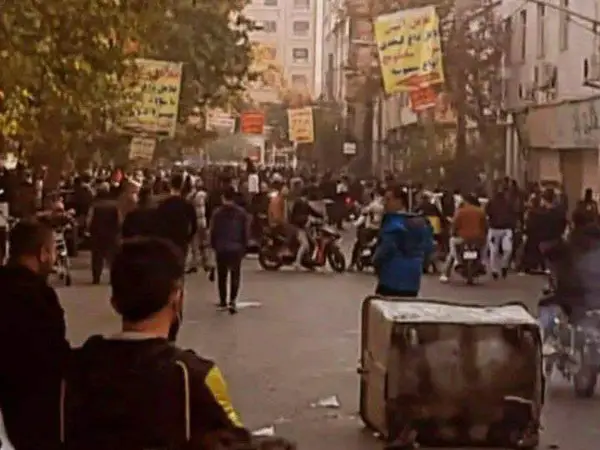The Islamic Republic has intensified its crackdown on antigovernment protests in Kurdish areas with military vehicles deployed and live bullets used against people.
Following violent clashes in the city of Mahabad on Saturday, a small Kurdish-majority city in West Azarbaijan province, the people of other cities across the country – especially Kurdish ones -- held protests in solidarity with Mahabad. The majority of Iran's 10 million Kurds live in the western parts of the country.
In addition to Kurdish cities such as Kermanshah, Paveh,Kamyaranand Saqqez – the hometown of Mahsa Amini -- people in the capital Tehran, the religious cityof Mashhad,Ardabil, and Orouniyeh (Urmia) as well as Kerman and Esfahan in central Iran poured onto streets to express their support for the protesters in Kurdish cities.
Videos on social media show a convoy of military vehicles with heavily armed troops in Mahabad while the sounds of heavy weaponry and incessant shooting can be heard. According to reports, military helicopters also carried members of the Revolutionary Guard to quell the protests in the city while streets have started to look like a battlefield. The IRGC also confirmed "strengthening" its forces in the Kurdish regions to confront "terrorist separatist groups" in the area. "The security of the people is our red line ... and dealing decisively with terrorists is our mandate," a statement by state media said.
The clerical regime has been trying to blame “rioters”, terrorists” and “separatists” for the two-month-long uprising, while protesters act with national unity as their motto.
US Secretary of State Antony Blinken expressed concerns on Sunday “that Iranian authorities are reportedly escalating violence against protesters, particularly in the city of Mahabad. We continue to pursue accountability for those involved, as we support the Iranian people.”
Prominent Sunni cleric Molavi Abdolhamid, a powerful dissenting voice in the Shiite-ruled Islamic Republic, called on security forces to refrain from shooting at people in Mahabad, who are mainly Sunnis. "Disturbing news is emerging from the Kurdish areas, especially from Mahabad ... pressure and crackdown will lead to further dissatisfaction," he tweeted.
According to reports, at least six people were killed during Sunday clashes in Piranshahr, also in West Azarbaijan, Javanrud in Kermanshah province, and Sanandaj in Kordestan. Activist account 1500Tasvir said a 16-year-old student and a schoolteacher were killed in Javanrud.
Nationwide protests in the country were ignited by the death of 22-year-old Iranian Kurdish woman Mahsa Amini in mid-September while she was in the custody of ‘morality police’. The current wave of the protests – the boldest challenge against the clerical regime -- has been described as a revolution by many pundits. The authorities have already responded with a heavy-handed crackdown that US-based Human Rights Activists News Agency (HRANA) said in its latest report that from September 16 until Friday, November 18, at least 402 protestors have been killed -- including at least 58 minors -- half a dozen already sentenced to death and more than 15,000 arrested.
A Kurdish human rights group said that in Javanrud security forces opened fire at people from the rooftop of the city’s Judiciary building, the same spot they used during the shooting of protesters in November 2019, sometimes called Bloody November. Security forces killed at least 1,500 people in less than a week.
Hengaw, a Norway-based rights group which monitors abuses in Kurdish areas, said that "In the Kurdish city of Marivan repressive forces have opened fire at people."
In the town of Divandarreh, also located in Kordestan province, “the government’s repressive forces opened fire on protesters on Saturday, killing at least three civilians,” Hengaw reported.
The rights group claimed that the security forces have killed at least 25 people in Kurdish cities since last Tuesday, November 17, when protesters thronged streets on the anniversary of Bloody November. “Twenty-three people were killed by direct fire, one by torture, and one by knife stabs,” Hengaw said.
The Islamic Republic’s attacks on Kurds is not limited to the crackdown on protesters as the IRGC has also stepped up shelling of Iranian Kurdish parties in the Iraqi Kurdistan region.
Late on Sunday, the IRGC once again launched missile attacks against the positions of the dissident Iranian Kurdish group, the Democratic Party of Iranian Kurdistan in Erbil. At least three missiles hit the party's positions including a hospital, causing casualties. The IRGC also targeted the Komala Party's positions in Iraqi Kurdistan's Sulaymaniyah with drones, the party's secretary general confirmed to Iran International.
